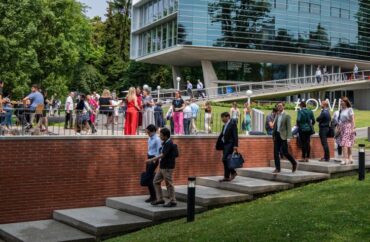
Singapore 27 June 2019 – How do we create content and prosperous cities in the age of uncertainty? A new book and ground-breaking research index by researchers at IMD business school and the Singapore University of Technology & Design’s Lee Kuan Yew Centre for Innovative Cities explores the concept of the “smart city” to help policymakers and business leaders understand the ideal conditions for growth and well-being in a rapidly-changing world.
‘Sixteen Shades of Smart: How Cities Can Shape Their Own Future’, launched at the Smart Nation Innovation Week in Singapore, is the first step in creating a pioneering IMD-SUTD Smart City Index, with sixteen case studies feeding into a preview index of diverse “smart cities” across the world.
The first edition of the full global Smart City Index, developed by the IMD Smart City Observatory, the IMD World Competitiveness Center and SUTD’s Lee Kuan Yew Centre for Innovative Cities, is expected to be published in October, covering 100 cities and providing a practical tool with policy recommendations to identify key drivers for competitiveness.
“All cities are now embarked on becoming smart. In Asia the race is on. Cities are learning from each other. They want to improve the lives of their people, and want to be competitive. Successful Asian cities have a unique approach to becoming smart: they have strong governance, consistent policy implementation, and a willingness to experiment with new technologies. This mindset allows them to leapfrog over traditional development modes”. Prof Chan Heng Chee, Chairman of the Lee Kuan Yew Centre for Innovative Cities, SUTD.
The pioneering and collaborative research focused on five key areas as a comprehensive evaluation of the sixteen “smart cities” worldwide: health & safety, mobility, activities (including environmental and cultural), opportunities (including educational and professional), and governance in a digital environment.
“Smart cities are vital for the future prosperity and happiness of our increasingly diverse populations as we seek to navigate the opportunities and challenges of a world in a state of constant flux,” said Bruno Lanvin, President of the IMD Smart City Observatory. “The publication of this research and preview of the forthcoming Smart City index is a crucial stepping stone towards creating an effective and unique barometer and tool for policymakers and business leaders to deliver the right mix of technological and non-technological structures for the future well-being of our urban communities.”
Of the sixteen cases studies, IMD focused on Amsterdam, Bilbao, Boston, Buenos Aires, Dubai, Medellin, Montreal, Ramallah, Tallinn and Zurich, while SUTD looked at Bengaluru, Chongqing, Jakarta, Kuala Lumpur, Seoul and Singapore.
The IMD Smart City Observatory was created in 2018 under the auspices of the IMD World Competitiveness Center.
About IMD business school: IMD is an independent business school with Swiss roots and global reach. Focused on developing leaders and transforming organizations, IMD designs and delivers interventions that challenge what is and inspire what could be.
The IMD Smart City Observatory (SCO), was created in 2018 under the auspices of the IMD World Competitiveness Center. The IMD World Competitiveness Center rankings have been produced every year since 1989 by the IMD World Competitiveness Center and are widely acknowledged as the leading annual assessment of the competitiveness of countries.
For the last 8 consecutive years, IMD has been ranked #1 in the world for Open executive programs and in the top three overall for executive education (Financial Times 2012-2019). Find our more here.
About Singapore University of Technology and Design (SUTD): seeks to advance knowledge and nurture technically grounded leaders and innovators to serve societal needs, through a focus on design and multi-disciplinary curriculum and research. Find out more here.
About Lee Kuan Yew Centre for Innovative Cities (LKYCIC): is a research institute in the Singapore University of Technology and Design. The Centre seeks to stimulate thinking and research on the critical issues of cities and urbanisation and explore the integrated use of technology, design and policy to provide urban solutions. Find out more here.


